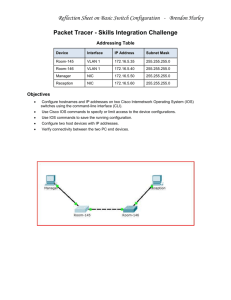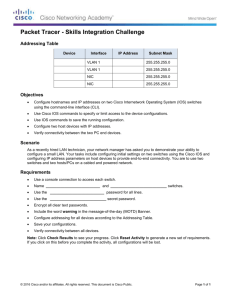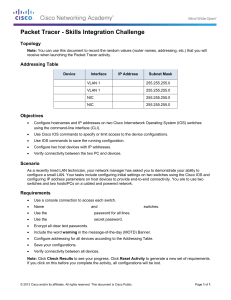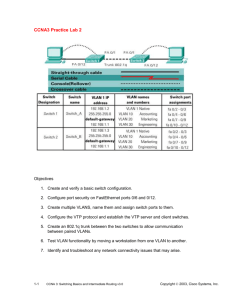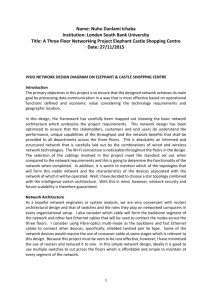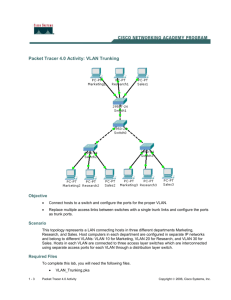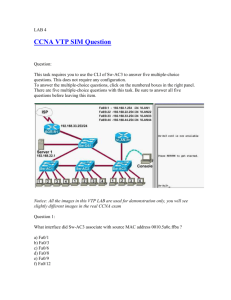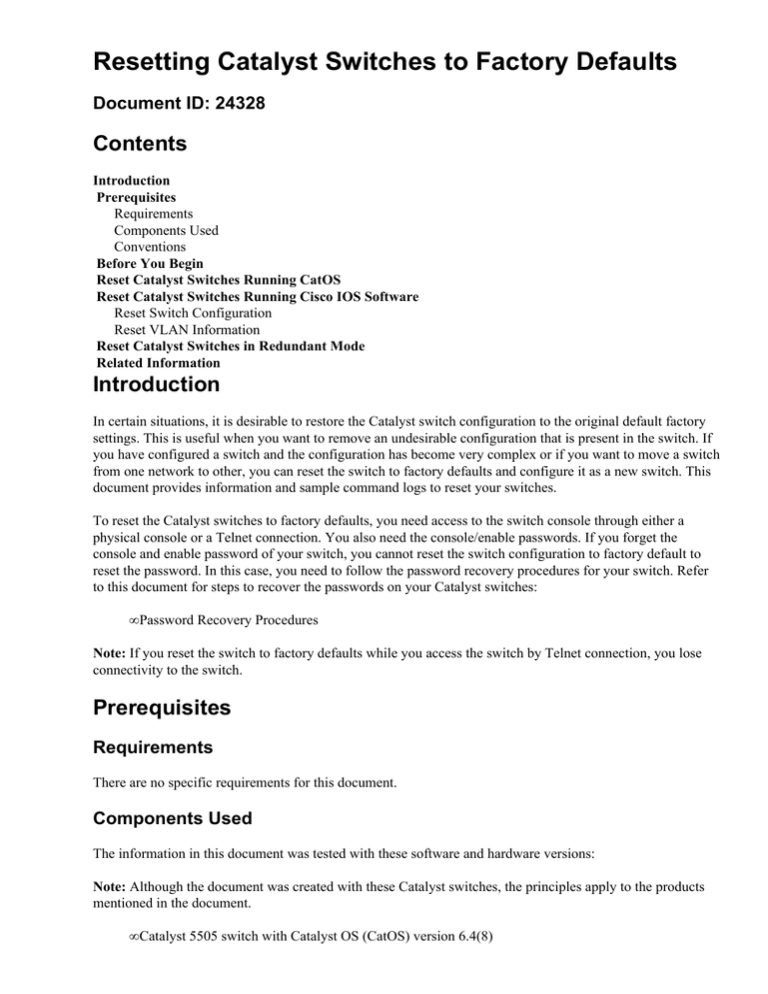
Resetting Catalyst Switches to Factory Defaults
Document ID: 24328
Contents
Introduction
Prerequisites
Requirements
Components Used
Conventions
Before You Begin
Reset Catalyst Switches Running CatOS
Reset Catalyst Switches Running Cisco IOS Software
Reset Switch Configuration
Reset VLAN Information
Reset Catalyst Switches in Redundant Mode
Related Information
Introduction
In certain situations, it is desirable to restore the Catalyst switch configuration to the original default factory
settings. This is useful when you want to remove an undesirable configuration that is present in the switch. If
you have configured a switch and the configuration has become very complex or if you want to move a switch
from one network to other, you can reset the switch to factory defaults and configure it as a new switch. This
document provides information and sample command logs to reset your switches.
To reset the Catalyst switches to factory defaults, you need access to the switch console through either a
physical console or a Telnet connection. You also need the console/enable passwords. If you forget the
console and enable password of your switch, you cannot reset the switch configuration to factory default to
reset the password. In this case, you need to follow the password recovery procedures for your switch. Refer
to this document for steps to recover the passwords on your Catalyst switches:
• Password Recovery Procedures
Note: If you reset the switch to factory defaults while you access the switch by Telnet connection, you lose
connectivity to the switch.
Prerequisites
Requirements
There are no specific requirements for this document.
Components Used
The information in this document was tested with these software and hardware versions:
Note: Although the document was created with these Catalyst switches, the principles apply to the products
mentioned in the document.
• Catalyst 5505 switch with Catalyst OS (CatOS) version 6.4(8)
• Catalyst 2950 switch with Cisco IOS® Software Release 12.1(19)EA1
• Catalyst 6500/6000 switch with Cisco IOS Software Release 12.1(20)E
The information in this document was created from the devices in a specific lab environment. All of the
devices used in this document started with a cleared (default) configuration. If your network is live, make sure
that you understand the potential impact of any command.
Conventions
For more information on document conventions, refer to the Cisco Technical Tips Conventions.
Before You Begin
Before you reset the switch to factory defaults, perform one of these tasks:
• Back up your configuration on a TFTP server.
• Copy your configuration to a text file.
• Copy the configuration locally on the bootflash or slot0: device.
Once you clear the user configuration, there is no way to recover the configuration unless you restore the
backed−up configuration. To upload a configuration file on a TFTP server, refer to this document:
• Working with Configuration Files
Note: You can restore the complete configuration if you copy the text file configuration and paste it to the
command line.
Reset Catalyst Switches Running CatOS
This procedure applies to Catalyst 4500/4000, 5500/5000, and 6500/6000 series switches running CatOS.
These switches store the configuration in NVRAM automatically, wherever users enter the commands in
enable mode. On Cisco IOS Software, you must save the configuration with the write memory command or
the copy running−config startup−config command. You can reset the system or module configuration on
these switches running CatOS to factory defaults with the clear config command. The command syntax is:
clear config {mod | rmon | all | snmp | acl {nvram}}
The clear config all command clears the system configuration, as well as the module configuration. This
command does not, however, clear the boot variables, such as config−register and boot system settings. You
can alter the boot variable settings with the set boot command. If your switch has any router cards, the clear
config all command does not clear the Cisco IOS Software configuration on the router cards. (Examples of
these router cards include WS−X4232−L3 modules on the 4000 switches, Route Switch Modules
[RSMs]/Route Switch Feature Cards [RSFCs] on the 5500/5000 switches, or the Multilayer Switch Modules
[MSMs]/Multilayer Switch Feature Cards [MSFCs] on the 6500/6000 switches.) To clear the configuration on
router cards, you can access the router card with the session command. Then, reset the switch to factory
defaults with use of the procedure in the Reset Catalyst Switches Running Cisco IOS Software section of this
document. This example shows how to reset the configuration on the switch to factory defaults:
Cat5k> (enable) clear config all
This command will clear all configuration in NVRAM.
This command will cause ifIndex to be reassigned on the next system startup.
Do you want to continue (y/n) [n]? y
...........
..........
................................
2002 Aug 03 15:16:19 %MLS−5−MCAST_STATUS:IP Multicast Multilayer Switching is disabled
System configuration cleared.
Use 'session' command to clear ATM or Router specific configurations.
Console> (enable)
Console> (enable)
After the configuration erase in CatOS, you do not need to reload the switch. The configuration takes effect
immediately, and the switch returns to the factory default configuration. If you want to clear the configuration
of a specific module on the switch, issue the clear config mod command, as shown here:
Cat5k> (enable) clear config 5
This command will clear module 5 configuration.
Do you want to continue (y/n) [n]? y
................................
Module 5 configuration cleared.
Cat5k> (enable)
Cat5k> (enable)
Reset Catalyst Switches Running Cisco IOS Software
The procedure in this section applies to the router cards, the modular or fixed configuration switches, and
GL−3 Catalyst series switches running Cisco IOS Software:
• Router cards
♦ WS−X4232−L3 (Catalyst 4006/4000)
♦ RSM/RSFC (Catalyst 5500/5000)
♦ MSFC/MSM (Catalyst 6500/6000)
• Catalyst modular switches
♦ Catalyst 6500/6000
♦ Catalyst 4500/4000
• Catalyst fixed configuration switches
♦ Catalyst 2940
♦ Catalyst 2950/2955
♦ Catalyst 2970
♦ Catalyst 3550
♦ Catalyst 3560
♦ Catalyst 3750
♦ Catalyst 2900XL/3500XL
• GL−3 Catalyst switches
♦ Catalyst 2948G−L3
♦ Catalyst 4908G−L3
Switches running Cisco IOS Software have a running configuration file and a startup configuration file. The
RAM stores the running configuration, and the NVRAM stores the startup configuration. When you make a
configuration change to a switch running Cisco IOS Software, the change becomes part of the running
configuration. You must save the configuration changes to the startup configuration; otherwise, the
configuration is lost during the next reload or power outage. This is because you lose the running
configuration stored in RAM when you reload the switch or turn off the power. To save the configuration into
NVRAM, issue the write memory command or the copy running−config startup−config command. If you
do not save your changes to NVRAM, the changes clear from RAM and are no longer part of the startup
configuration when the switch reloads.
On the Catalyst modular or fixed configuration switches running Cisco IOS Software, a separate file stores the
VLAN information. The file is called vlan.dat file and is stored in NVRAM for modular switches or in Flash
for fixed configuration switches. To reset these switches to factory defaults, you need to delete the startup
configuration and the vlan.dat file. To restore the Catalyst 2948G−L3/4908G−L3 switches and router cards to
the factory defaults, you only need to delete the startup configuration file. These switches do not contain
VLAN information because they do not participate in VLAN Trunk Protocol (VTP).
Reset Switch Configuration
To reset the switch to factory default, issue the erase startup−config or write erase command. This
command does not clear the boot variables, such as config−register and boot system settings. You can alter
the boot system parameters with the boot command. In Catalyst 4500/4000 and 6500/6000 series switches
running Cisco IOS Software, you can change the configuration register value with the config−register
command.
This example shows how to reset a switch running Cisco IOS Software to factory defaults with the write
erase command:
Cat2950# write erase
Erasing the nvram filesystem will remove all files! Continue? [confirm]y[OK]
Erase of nvram: complete
Cat2950#
Cat2950# reload
System configuration has been modified. Save? [yes/no]: n
!−−− Do not save the configuration at this prompt. Otherwise, the switch
!−−− reloads with the current running configuration and does not reset to default.
Proceed with reload? [confirm]y
2w0d: %SYS−5−RELOAD: Reload requested
C2950 Boot Loader (C2950−HBOOT−M) Version 12.1(11r)EA1, RELEASE SOFTWARE (fc1)
Compiled Mon 22−Jul−02 18:57 by antonino
WS−C2950G−12−EI starting...
!−−− Output suppressed.
32K bytes of flash−simulated non−volatile configuration memory.
Base ethernet MAC Address: 00:05:DC:C9:79:00
Motherboard assembly number: 73−5781−08
Motherboard serial number: FAB0515A069
Model revision number: 02
Model number: WS−C2950−24
System serial number: FAB0517Q00B
−−− System Configuration Dialog −−−
Would you like to enter the initial configuration dialog? [yes/no]:n
00:00:16: %SPANTREE−5−EXTENDED_SYSID: Extended SysId enabled for type vlan
00:00:21: %SYS−5−RESTART: System restarted −−
Cisco Internetwork Operating System Software
IOS (tm) C2950 Software(C2950−I6Q4L2−M)Version 12.1(19)EA1, RELEASE SOFTWARE (fc1)
Copyright (c) 1986−2003 by cisco Systems, Inc.
Compiled Tue 09−Dec−03 00:12 by yenanh
Press RETURN to get started!
00:00:37: %LINK−5−CHANGED: Interface Vlan1, changed state to administratively down
00:00:38: %LINEPROTO−5−UPDOWN: Line protocol on Interface Vlan1, changed state to down
Switch>
Switch>
At this stage, the switch configuration has reset to the factory defaults, with the exclusion of the VLAN
information.
Reset VLAN Information
To reset the VLAN information to the factory defaults, delete the vlan.dat file from the Flash or NVRAM and
reload the switch. On the 6500/6000 series switches running Cisco IOS Software, the vlan.dat file is stored in
const_nvram. On the 4500/4000 series switches running Cisco IOS Software, the vlan.dat file is stored in
cat4000_flash:. On the 2940, 2950/2955, 2970, 3550, 3550, 3560, 3570, and 2900XL/3500XL fixed
configuration switches, the vlan.dat file is stored in flash:.
To erase the vlan.dat file on the 6500/6000 switches, issue the erase const_nvram: command. On the
4500/4000 switches, issue the erase cat4000_flash: command. On the fixed configuration switches, issue the
delete flash:vlan.dat command.
The example steps show how to delete the VLAN information on Catalyst fixed configuration switches. You
can use the same steps, with their respective commands, for the 6500/6000 and 4500/4000 running Cisco IOS
Software:
1. To verify the VLAN information, issue the show vlan command, and to verify the vlan.dat file, issue
the dir command.
Cat2950# show vlan
VLAN Name
Status
Ports
−−−− −−−−−−−−−−−−−−−−−−−−−−−−−−−−−−−− −−−−−−−−− −−−−−−−−−−−−−−−−−−−−−−−−−−−−−−−
1
default
active
Fa0/1, Fa0/2, Fa0/3, Fa0/4
Fa0/5, Fa0/6, Fa0/7, Fa0/8
Fa0/9, Fa0/10, Fa0/11, Fa0/12
Fa0/13, Fa0/14, Fa0/15, Fa0/16
Fa0/17, Fa0/18, Fa0/19, Fa0/20
Fa0/21, Fa0/22, Fa0/23, Fa0/24
2
3
4
VLAN0002
VLAN0003
VLAN0004
active
active
active
!−−− Despite the erase of the startup configuration file,
!−−− these user−created VLANs remain.
600
1002
1003
1004
1005
VLAN0600
fddi−default
token−ring−default
fddinet−default
trnet−default
VLAN
−−−−
1
2
3
4
600
Type
−−−−−
enet
enet
enet
enet
enet
SAID
−−−−−−−−−−
100001
100002
100003
100004
100600
MTU
−−−−−
1500
1500
1500
1500
1500
active
active
active
active
active
Parent
−−−−−−
−
−
−
−
−
RingNo
−−−−−−
−
−
−
−
−
BridgeNo
−−−−−−−−
−
−
−
−
−
Stp
−−−−
−
−
−
−
−
BrdgMode
−−−−−−−−
−
−
−
−
−
Trans1
−−−−−−
1002
0
0
0
0
Trans2
−−−−−−
1003
0
0
0
0
1002 fddi
1003 tr
1004 fdnet
1005 trnet
Switch#
101002
101003
101004
101005
1500
1500
1500
1500
−
1005
−
−
−
−
−
−
−
−
1
1
−
−
ibm
IBM
−
srb
−
−
1
1
0
0
1003
1002
0
0
Cat2950# dir flash:
!−−− On the 4500/4000, issue the dir cat4000_flash: command.
!−−− On the 6500/6000, issue the dir const_nvram: command.
Directory of flash:/
2
3
−rwx
−rwx
2487439
840
Mar 11 1993 01:25:32
Mar 20 1993 09:20:09
c2950−i6q4l2−mz.121−9.EA1d.bin
vlan.dat
!−−− This vlan.dat file stores user−configured VLANs.
4
6
7
8
19
−rwx
−rwx
−rwx
drwx
−rwx
2491435
42
109
640
109
Mar 08 1993 16:14:13
Mar 01 1993 00:07:35
Mar 11 1993 01:23:56
Mar 11 1993 01:26:35
Mar 11 1993 01:26:35
c2950−mvr.bin
env_vars
info
html
info.ver
7741440 bytes total (1088512 bytes free)
Switch#
2. Delete the VLAN information from Flash or NVRAM, and reload the switch.
Note: On the 6500/6000 and 4500/4000 running early versions of Cisco IOS Software, the delete
command may not work. Instead, you must issue the command erase const_nvram: or the command
erase cat4000_flash:. Do not specify the vlan.dat file in the command syntax. However, on later
versions of Cisco IOS Software, the delete const_nvram:vlan.dat command works for the
6500/6000, and the delete cat4000_flash:vlan.dat command works on the 4500/4000.
Cat2950# delete flash:vlan.dat
Delete filename [vlan.dat]?
!−−− Press Enter.
Delete flash:vlan.dat? [confirm]y
Cat2950# reload
Proceed with reload? [confirm]y
4w5d: %SYS−5−RELOAD: Reload requested
3. After reload, check the VLAN information with the show vlan command.
The user−configured VLANs no longer appear in the command output. Only factory−default VLAN
information is on the switch.
Cat2950# show vlan
VLAN Name
Status
Ports
−−−− −−−−−−−−−−−−−−−−−−−−−−−−−−−−−−−− −−−−−−−−− −−−−−−−−−−−−−−−−−−−−−−−−−−−−−−−
1
default
active
Fa0/1, Fa0/2, Fa0/3, Fa0/4
Fa0/5, Fa0/6, Fa0/7, Fa0/8
Fa0/9, Fa0/10, Fa0/11, Fa0/12
Fa0/13, Fa0/14, Fa0/15, Fa0/16
Fa0/17, Fa0/18, Fa0/19, Fa0/20
Fa0/21, Fa0/22, Fa0/23, Fa0/24
1002 fddi−default
active
1003 token−ring−default
active
1004 fddinet−default
active
1005 trnet−default
VLAN Type
−−−− −−−−−
1
enet
1002 fddi
1003 tr
1004 fdnet
1005 trnet
Switch#
SAID
−−−−−−−−−−
100001
101002
101003
101004
101005
active
MTU
−−−−−
1500
1500
1500
1500
1500
Parent
−−−−−−
−
−
−
−
−
RingNo
−−−−−−
−
−
−
−
−
BridgeNo
−−−−−−−−
−
−
−
−
−
Stp
−−−−
−
−
−
ieee
IBM
BrdgMode
−−−−−−−−
−
−
−
−
−
Trans1
−−−−−−
0
0
0
0
0
Trans2
−−−−−−
0
0
0
0
0
Reset Catalyst Switches in Redundant Mode
For the 6500/6000 and 5500/5000 switches running CatOS in redundant mode, the standby Supervisor Engine
synchronizes with changes made to the active Supervisor Engine. So, if you reset the configuration on the
active Supervisor Engine to factory defaults with the clear config command, the standby Supervisor Engine
also resets to factory defaults. Whether you set the configuration mode to binary or text mode with the set
config mode command, the switch resets to factory defaults when you clear the configuration on the active
Supervisor Engine.
To reset 6500/6000 switches running Cisco IOS Software in redundant mode to factory defaults, you need to
complete these steps:
1. Erase the startup configuration with the erase startup−config command on the active Supervisor
Engine.
Note: This also erases the startup configuration on the standby Supervisor Engine.
2. Delete the vlan.dat file as shown in the Reset VLAN Information section of this document.
3. Reload the active Supervisor Engine with the reload command
Note: If the Supervisor Engine enters the ROMmon mode after it reloads, check the boot variable to see if it is
set to boot from the proper image. You may also refer to the document Recovering a Catalyst 6500/6000
Running Cisco IOS System Software from a Corrupted or Missing Boot Loader Image or ROMmon Mode for
further troubleshooting information.
Related Information
• LAN Product Support Pages
• LAN Switching Support Page
• Technology Support
• Hardware Support
• Technical Support & Documentation − Cisco Systems
Contacts & Feedback | Help | Site Map
© 2012 − 2013 Cisco Systems, Inc. All rights reserved. Terms & Conditions | Privacy Statement | Cookie Policy | Trademarks of
Cisco Systems, Inc.
Updated: Dec 21, 2005
Document ID: 24328

